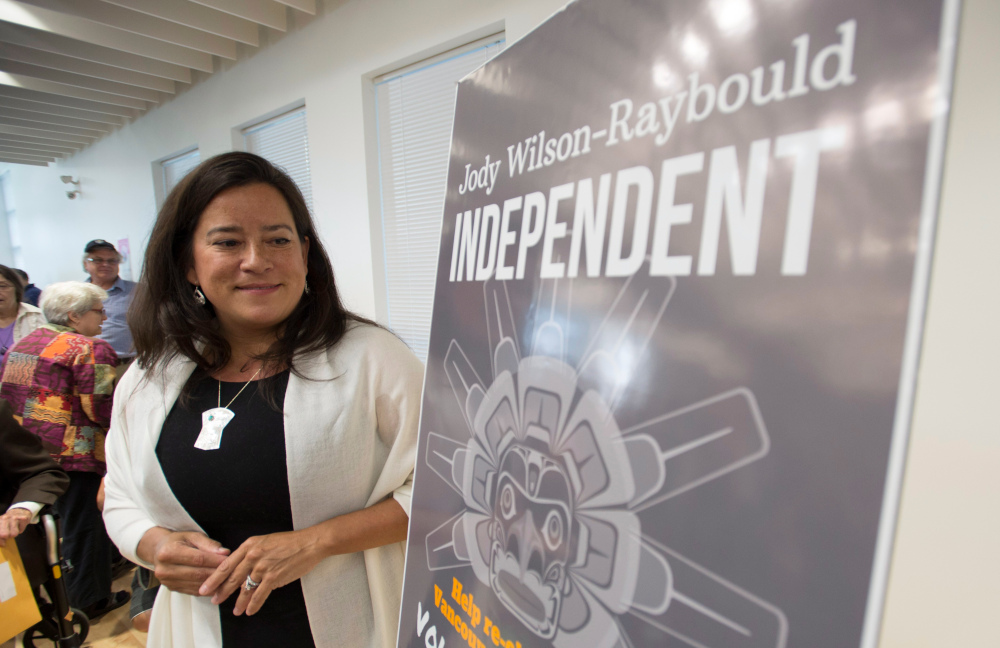- From Where I Stand: Rebuilding Indigenous Nations for a Stronger Canada
- UBC Press Books (2019)
Most books by politicians published during an election campaign have very short half-lives: their purpose is to generate some news stories and reviews and shift some votes in the desired direction.
Tom Mulcair’s 2015 autobiography was typical of the genre. So was Justin Trudeau’s 2014 book Common Ground, though Trudeau’s victory gave it a longer half-life than most.
Jody Wilson-Raybould’s new book, however, is nothing like those carefully candid accounts. She may be running as an Independent in her Vancouver-Granville riding, but this book is unlikely to be snapped up by undecided voters. It’s a compendium of speeches she delivered between 2010 and last June, and it offers no titillating details about her personal life or her famous falling-out with Trudeau. This is a serious book about serious political issues.
The last book by a Canadian politician that resembles Wilson-Raybould’s is Pierre Elliott Trudeau’s Federalism and the French Canadians. Both deal with the changing role of a component of our population. Both are cerebral analyses of a given political situation; both point to existing problems and possible solutions. And both analysts are clearly thinking over the long term, not just the few weeks of an election campaign.
Just as Trudeau’s essays were written over some years and show his thoughts evolving, Wilson-Raybould’s speeches were written over nine years and reflect her changing roles: from Regional Chief of the BC Assembly of First Nations to justice minister to Independent MP. She understands the opportunity created by her own success: speaking at an Aboriginal Law Forum in 2010, she points out that “...50 years ago there were no First Nations lawyers, because prior to 1951 the Indian Act defined a ‘person’ as ‘an individual other than an Indian.’”
Wilson-Raybould endorses the UN Declaration on the Rights of Indigenous Peoples but points out that it will make no difference in the lives of Indigenous Canadians. “They have to vote for social change,” she argues. “The twisted reality of our postcolonial transition is that our people have to vote the colonizer out.”
A few years later, as justice minister, Wilson-Raybould explains the Canadian situation at a conference in Australia. She recalls her father, Bill Wilson, going “toe to toe” with Pierre Trudeau at a 1983 constitutional conference and pointing out, “It has now become all of a sudden a question of power and who exercises it.”
Most of her speeches are to Indigenous or legal/academic audiences, and they reflect both a shared experience and Wilson-Raybould’s efforts to think beyond that experience. She argues against “final agreements.”
“We are not making claims; we are reconciling, and the process of reconciliation is ongoing, not final.”
Many non-Indigenous readers may find Wilson-Raybould’s terms (“postcolonial door,” “fiduciary,” etc.) a bit esoteric — but that reflects our own lack of awareness of the concerns and vocabulary of Indigenous discourse. If we actually understood that vocabulary, we would be a lot further along in the ongoing process of reconciliation.
Implicit in Wilson-Raybould’s view is the radical transformation of Canada from a colonizing, white-dominated state to a truly diverse society of equals — a society making decisions by consensus, not by who has power and exercises it. She recognizes the challenge: the advocates for Indigenous peoples are, like her, the products of the colonizing state. Somehow, they must use Indigenous values to de-colonize the state that made them.
Only in the last two speeches does Wilson-Raybould comment much on the SNC-Lavalin affair that led to her ouster, and she shows remarkable restraint. But she uses her own culture to demolish Trudeau’s pretensions.
“In our system,” she says, “I am a ‘Hiligaxste’ — a role always held by women. One of my jobs is to lead the Hamatsa, the Chief, into the Big House. This role can be translated as one that ‘corrects the Chief’s path.’ We show them the ways, a metaphor for life and, in the Potlatch, symbolized in our rituals where, symbolically, the power of the Hamatsa is ‘tamed’ and he is ready to be Chief.”
Clearly, she could not tame the power of Justin Trudeau, and he, not Wilson-Raybould, has paid a greater price; his refusal to take her counsel began his current downward spiral.
Wilson-Raybould goes on to describe how, in her communitarian culture, everyone has a role to play: “I call it balance. In fact, our whole system was about balance — between men and women, between Clans, and between tribes.” It is an eerie echo of Pierre Elliott Trudeau’s desire for political “counterbalances” to prevent any one group from dominating the others.
Whatever the outcome of the election on Oct. 21, we have not heard the last of Wilson-Raybould. If she’s elected, she will return to the House with far more authority and influence than an ordinary Independent MP. If she’s defeated, she will continue her advocacy for Indigenous peoples with far greater influence than she had before 2015.
Whoever forms the next government will have to deal with her; she has tamed one leader, and can likely tame the next. ![]()
Read more: Election 2019, Indigenous

















Tyee Commenting Guidelines
Comments that violate guidelines risk being deleted, and violations may result in a temporary or permanent user ban. Maintain the spirit of good conversation to stay in the discussion.
*Please note The Tyee is not a forum for spreading misinformation about COVID-19, denying its existence or minimizing its risk to public health.
Do:
Do not: